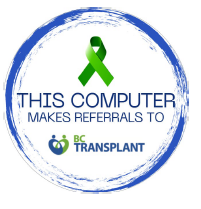According to Bobbi Paquette, BC Transplant (BCT) in-hospital coordinator, the easier it is for healthcare providers to make referrals, the more likely they will identify eligible patients and refer them to BCT in a timely manner. This helps reduce missed opportunities for donation, ensuring eligible patients and their families are given the chance to consider organ donation.
“Most Canadians value the altruistic act of organ donation and want to help others in need. By improving coordination between healthcare teams and streamlining referrals, we can maximize the number of successful donations and ultimately save more lives," shares Bobbi, who has been instrumental in piloting this important initiative.
The iReferral system is currently in use in many organ and tissue programs in the U.S., but BC Transplant is the first in Canada to adopt the system. It is being implemented with funding support from a pan-Canadian initiative co-led by Canada Health Infoway and the Canadian Institute for Health Information that is modernizing how organ donation and transplantation data is collected, managed, and reported across the country.
ICU teams access the secure, digital iReferral portal directly from desktop computers in their units. The online form collects all the information necessary for the initial referral of a potential organ donor without any third-party involvement. Once a referral is entered into iReferral, BCT is notified immediately, with all the important patient details already captured.
Prior to this, critical care teams called in their referrals to a third-party service, which would then notify BCT's on-call coordinator. From there, BCT would call the hospital back to get necessary patient information. The multi-step process was often time-consuming and inefficient. Additionally, healthcare staff had to step away from patient care twice—first to make the initial referral call and again to provide patient information during the coordinator's follow-up call.
By automating the process and removing the third-party intermediary, electronic referrals significantly reduce the time spent gathering patient information and minimize the risks of miscommunication.
BCT's senior quality assurance coordinator Jillian McKay played a crucial role in setting up the system in BC and helped create training materials for the roll out.
Jillian adds, “Huge kudos to our BCT staff who have been in the hospitals doing all the education and customizing the training for each group. The updated process means less time away from the bedside for hospital staff to do a referral and easier screening for BCT coordinators to identify donor suitability."
 Since the launch of iReferral, the three pilot hospital sites – Kelowna General Hospital, Abbotsford Regional Hospital and Nanaimo General Hospital – have seen a significant increase in timely referrals. Two out of three of the hospitals had a 100 per cent increase in donor referrals in their first quarter compared to this time last year, when this new iReferral process was not an option.
Since the launch of iReferral, the three pilot hospital sites – Kelowna General Hospital, Abbotsford Regional Hospital and Nanaimo General Hospital – have seen a significant increase in timely referrals. Two out of three of the hospitals had a 100 per cent increase in donor referrals in their first quarter compared to this time last year, when this new iReferral process was not an option.
“Organ donation is very time sensitive so optimizing the end-to-end process is key to saving more lives," says Nicole Mateo, senior business analyst with BC Transplant's Health Information Management team.
iReferral has now expanded to five more sites: Royal Columbian, Victoria General, Royal Jubilee, Royal Inland and University of Northern British Columbia Hospitals. The next phase of expansion will include sites in Chilliwack, Burnaby, Prince George and Surrey. By the end of the year, iReferral should be available all around the province.
“Organ donation is one of the most profound gifts a person can give. With tools like iReferral in BC, the process is faster, and hopefully more equitable. If you haven't already, take a moment to register as an organ donor and talk to your family about your wishes," Bobbi adds.
One organ donor can save up to eight lives. To learn more, visit transplant.bc.ca.

